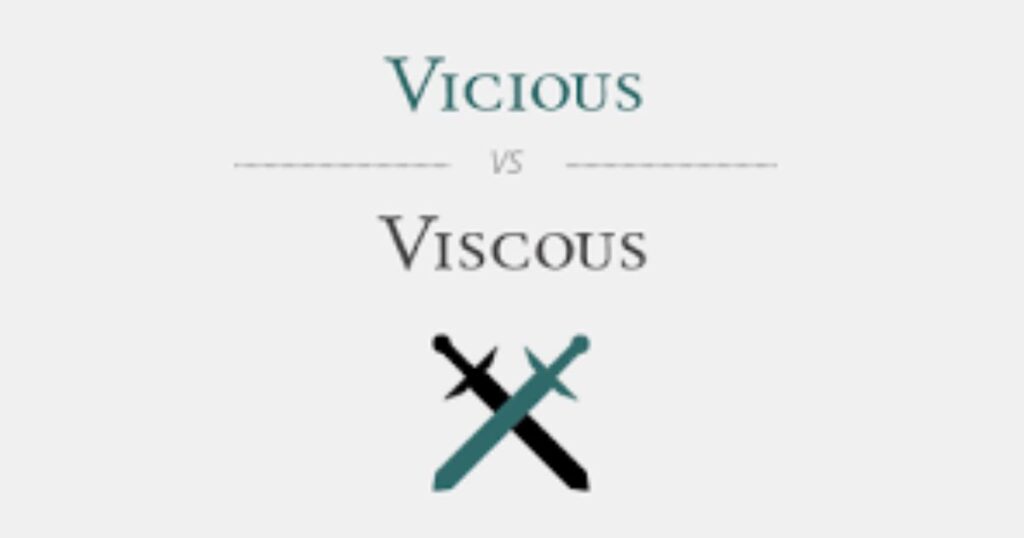When it comes to English, certain words can look or sound so similar that even the most careful writers mix them up. Vicious vs Viscous are two such words. They look alike, they sound alike, but they have very different meanings.
In this article, we’ll explore what each of these words means, why they’re confusing, and how you can use them correctly in your writing.
Why is There Confusion?
The confusion between vicious and viscous happens because of their similar spelling and pronunciation. Both words start with a “v” sound and end with “-ous,” which can easily lead to mix-ups, especially when reading or writing quickly. Here’s a quick guide to help with pronunciation:
- Vicious is pronounced VISH-uhs and refers to cruel or harmful behavior.
- Viscous is pronounced VISS-kuhs and describes something that’s thick and sticky, like honey.
While they might seem alike at first, they belong in very different contexts. Vicious is a term for harsh or aggressive actions, while viscous is a term for the texture of liquids. This difference in meaning can make it easier to remember which word to use once you know what each one means.
What Does the Word “Vicious” Mean?
The word vicious is an adjective that describes something extremely cruel, harmful, or mean. When we say something is vicious, we highlight its aggressive or harmful nature. Vicious actions are usually meant to cause pain, fear, or destruction. It’s commonly used to describe things like attacks, rumors, or cycles that seem to create damage or negativity.
Here are some examples:
- A vicious attack by an animal could leave a person badly injured.
- A vicious rumor can hurt someone’s reputation.
- A vicious cycle of poverty and crime describes a problem that keeps repeating in a damaging way.
The word vicious usually carries a negative feeling. It’s used in social, emotional, or physical situations where harm is a main factor.
READ MORE: What is the Plural of ‘Hair’? Is it ‘Hairs’ or ‘Hair’?
What Does the Word “Viscous” Mean?
The word viscous is also an adjective, but it has a very different meaning from vicious. When something is viscous, it has a thick, sticky consistency, and it doesn’t flow easily. Imagine pouring honey or molasses—that slow movement is what viscous describes. This word is often used in cooking, science, and manufacturing to describe liquids that don’t pour quickly.
Examples of things that are viscous include:
- Honey: Thick and sticky, honey is a classic example of a viscous liquid.
- Glue: Thick glues don’t pour easily because they are viscous.
- Engine oil: Some oils are more viscous than others, meaning they’re thicker and don’t flow as easily.
When something is viscous, it is hard to pour or stir because of its thick texture. It’s not negative or positive—it simply describes the quality of a liquid.
“Vicious vs Viscous”: The Differences

Let’s take a closer look at how vicious and viscous differ in meaning, usage, and context:
| Aspect | Vicious | Viscous |
| Part of Speech | Adjective | Adjective |
| Pronunciation | VISH-uhs | VISS-kuhs |
| Meaning | Extremely cruel, violent, or harmful | Thick, sticky, and resistant to flow |
| Context | Describes harmful behavior or actions | Describes the texture or consistency of liquids |
| Examples | A vicious attack, vicious rumor | Viscous syrup, viscous glue |
| Connotation | Negative; implies harm or severity | Neutral; describes a property of a substance |
| Common Fields | Social issues, criminal behavior | Cooking, chemistry, manufacturing |
| Synonyms | Cruel, brutal, savage | Thick, sticky, gooey |
| Antonyms | Kind, gentle, friendly | Thin, runny, liquid |
As you can see, these words have very different uses. Vicious is for describing harmful actions, while viscous is all about the physical quality of a liquid.
Examples in Context
Let’s look at each word in a bit more detail with specific examples.
Vicious:
- The vicious storm left a path of destruction through the town, tearing down trees and power lines.
- His vicious comments during the argument only made things worse, hurting everyone’s feelings.
- The politician was known for his vicious attacks on opponents, showing little mercy.
- The vicious dog growled and barked, scaring anyone who came close.
- Rumors about her spread in a vicious cycle that only seemed to grow with time.
In each of these examples, vicious is used to describe something aggressive, harmful, or damaging.
Viscous:
- The viscous honey dripped slowly off the spoon, sticking to everything.
- The chef used a viscous sauce in the dish, giving it a rich texture.
- After sitting for a long time, the viscous oil in the car needed to be changed.
- The viscous glue took a long time to dry but held everything together well.
- Scientists measured the viscous properties of the new substance in the lab.
In these examples, viscous is used to describe something thick and sticky, which takes its time to pour or flow.
Synonyms of Vicious vs Viscous
Let’s look at similar words for each to help reinforce the meanings.
Synonyms of “Vicious”:
- Cruel – Showing a desire to cause suffering.
- Brutal – Extremely harsh or unkind.
- Malicious – Meant to harm or hurt someone.
- Savage – Fierce and aggressive.
- Ferocious – Intense and frightening in a violent way.
- Wicked – Mean or morally wrong.
- Spiteful – Full of ill will or wanting to upset someone.
- Nasty – Very unpleasant or mean.
- Ruthless – Showing no pity or mercy.
Synonyms of “Viscous”:
- Thick – Dense and not easily flowing.
- Sticky – Having a glue-like quality.
- Gooey – Soft and sticky.
- Syrupy – Thick and sweet, similar to syrup.
- Slippery – A slick texture that clings due to thickness.
- Gluey – Like glue in texture.
- Gelatinous – Similar to jelly in consistency.
- Clammy – Moist and a bit sticky.
- Paste-like – Thick and similar to paste.
Each synonym helps illustrate the way each word can be used in a sentence or context.
Origins of “Vicious vs Viscous”
Understanding where each word came from can make them easier to remember.
Origins of “Vicious”
The word vicious dates back to the 14th century. Originally, it meant unwholesome or corrupt. It entered English from Anglo-French, where it was spelled vicious. This, in turn, came from the Latin word vitiosus, meaning full of faults or corrupt. Over time, vicious came to describe behaviors or actions that are not just bad but actively harmful or aggressive.
Origins of “Viscous”
The word viscous also goes back to the 14th century, coming from Anglo-French viscous, derived from Late Latin viscosus, which means sticky. The Latin term viscum refers to the sticky substance found on mistletoe berries, which have a thick, sticky quality. Over time, viscous came to describe any substance with a high resistance to flow, especially liquids.
Knowing the roots of these words can be helpful when you’re trying to choose between them.
ALSO READ: Oxymoron vs Juxtaposition: Unlocking the Differences
Conclusion
While vicious and viscous look and sound similar, their meanings are quite different. Remember, vicious is for describing something harmful, aggressive, or intentionally hurtful, while viscous is all about describing thick, slow-moving liquids. By keeping these differences in mind, you can choose the right word every time. Whether describing a vicious cycle in society or a viscous syrup in a recipe, understanding these terms can make your writing clearer and more effective.
Sources
- Merriam-Webster (Definition of Vicious)
- Merriam-Webster (Definition of Viscous)
- Etymonline (Etymology of Vicious)
- Etymonline (Etymology of Viscous)

Osbert is a skilled linguist and educator specializing in English grammar and vocabulary. With years of experience, he has dedicated his career to helping learners enhance their language skills. Osbert is passionate about simplifying complex grammar concepts and is the founder of EnglishInfoz.com, a platform focused on English language education.
